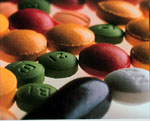Tip sheets highlight timely news and events at Washington University in St. Louis. For more information on any of the stories below or for assistance in arranging interviews, please see the contact information listed with each story.
The hidden tax of terror
American businesses play critical and costly role in global war on terrorism

The economic power of American businesses is playing a key role in the war on terrorism: helping cut off the flow of money to terrorist groups, producing anti-terrorist equipment, screening employees and visitors entering company facilities, manufacturing the medicines to respond to biological and chemical attacks, and making the weapons used by our armed forces in the fight. Nevertheless, such responses often raise the cost of production and act like a new tax on private enterprise, suggests Washington University in St. Louis economist Murray Weidenbaum.
Prescription drugs
Canadian drug imports won’t bring down the costs of drugs; would likely raise prices

Most retailers are enthusiastic about sales prospects for the holiday season. Estimates for same store sales growth of five to seven percent are expected, according to Martin Sneider, a professor of retailing at the John M. Olin School of Business at Washington University in St. Louis. “These forecasts are far more robust than the numbers posted last year. Estimates for price-driven stores like Wal-Mart and Costco are at the high end of analyst’s expectations,” Sneider says. Meanwhile, online holiday shopping is expected to grow by 20 to 40 percent, he says.

“The Court’s decision is a tremendous victory for law enforcement officers,” says Christopher Bracey, an expert in the fields of American race relations and criminal procedure and an associate professor of law at Washington University in St. Louis. “The 9th Circuit decision, which was reversed by the Supreme Court, would have required officers to consider a multitude of factors when deciding how long to delay execution of a search warrant following the initial knock on the door.” According to Bracey, the only problematic portion of the opinion is the large exception that allows “no knock” forced entries by law officers. “‘No knock’ policies have been controversial for years in part because, historically, ‘no knock’ entries lead to increased claims of police brutality and unnecessary property damage.”